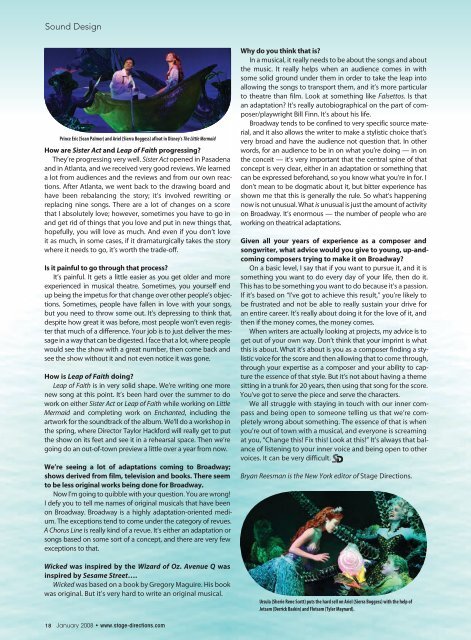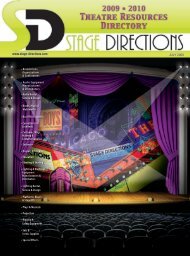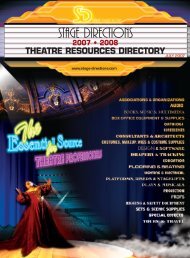Download a PDF - Stage Directions Magazine
Download a PDF - Stage Directions Magazine
Download a PDF - Stage Directions Magazine
You also want an ePaper? Increase the reach of your titles
YUMPU automatically turns print PDFs into web optimized ePapers that Google loves.
Sound Design<br />
Prince Eric (Sean Palmer) and Ariel (Sierra Boggess) afloat in Disney’s The Little Mermaid<br />
How are Sister Act and Leap of Faith progressing?<br />
They’re progressing very well. Sister Act opened in Pasadena<br />
and in Atlanta, and we received very good reviews. We learned<br />
a lot from audiences and the reviews and from our own reactions.<br />
After Atlanta, we went back to the drawing board and<br />
have been rebalancing the story; it’s involved rewriting or<br />
replacing nine songs. There are a lot of changes on a score<br />
that I absolutely love; however, sometimes you have to go in<br />
and get rid of things that you love and put in new things that,<br />
hopefully, you will love as much. And even if you don’t love<br />
it as much, in some cases, if it dramaturgically takes the story<br />
where it needs to go, it’s worth the trade-off.<br />
Is it painful to go through that process?<br />
It’s painful. It gets a little easier as you get older and more<br />
experienced in musical theatre. Sometimes, you yourself end<br />
up being the impetus for that change over other people’s objections.<br />
Sometimes, people have fallen in love with your songs,<br />
but you need to throw some out. It’s depressing to think that,<br />
despite how great it was before, most people won’t even register<br />
that much of a difference. Your job is to just deliver the message<br />
in a way that can be digested. I face that a lot, where people<br />
would see the show with a great number, then come back and<br />
see the show without it and not even notice it was gone.<br />
How is Leap of Faith doing?<br />
Leap of Faith is in very solid shape. We’re writing one more<br />
new song at this point. It’s been hard over the summer to do<br />
work on either Sister Act or Leap of Faith while working on Little<br />
Mermaid and completing work on Enchanted, including the<br />
artwork for the soundtrack of the album. We’ll do a workshop in<br />
the spring, where Director Taylor Hackford will really get to put<br />
the show on its feet and see it in a rehearsal space. Then we’re<br />
going do an out-of-town preview a little over a year from now.<br />
We’re seeing a lot of adaptations coming to Broadway;<br />
shows derived from film, television and books. There seem<br />
to be less original works being done for Broadway.<br />
Now I’m going to quibble with your question. You are wrong!<br />
I defy you to tell me names of original musicals that have been<br />
on Broadway. Broadway is a highly adaptation-oriented medium.<br />
The exceptions tend to come under the category of revues.<br />
A Chorus Line is really kind of a revue. It’s either an adaptation or<br />
songs based on some sort of a concept, and there are very few<br />
exceptions to that.<br />
Wicked was inspired by the Wizard of Oz. Avenue Q was<br />
inspired by Sesame Street….<br />
Wicked was based on a book by Gregory Maguire. His book<br />
was original. But it’s very hard to write an original musical.<br />
Why do you think that is?<br />
In a musical, it really needs to be about the songs and about<br />
the music. It really helps when an audience comes in with<br />
some solid ground under them in order to take the leap into<br />
allowing the songs to transport them, and it’s more particular<br />
to theatre than film. Look at something like Falsettos. Is that<br />
an adaptation? It’s really autobiographical on the part of composer/playwright<br />
Bill Finn. It’s about his life.<br />
Broadway tends to be confined to very specific source material,<br />
and it also allows the writer to make a stylistic choice that’s<br />
very broad and have the audience not question that. In other<br />
words, for an audience to be in on what you’re doing — in on<br />
the conceit — it’s very important that the central spine of that<br />
concept is very clear, either in an adaptation or something that<br />
can be expressed beforehand, so you know what you’re in for. I<br />
don’t mean to be dogmatic about it, but bitter experience has<br />
shown me that this is generally the rule. So what’s happening<br />
now is not unusual. What is unusual is just the amount of activity<br />
on Broadway. It’s enormous — the number of people who are<br />
working on theatrical adaptations.<br />
Given all your years of experience as a composer and<br />
songwriter, what advice would you give to young, up-andcoming<br />
composers trying to make it on Broadway?<br />
On a basic level, I say that if you want to pursue it, and it is<br />
something you want to do every day of your life, then do it.<br />
This has to be something you want to do because it’s a passion.<br />
If it’s based on “I’ve got to achieve this result,” you’re likely to<br />
be frustrated and not be able to really sustain your drive for<br />
an entire career. It’s really about doing it for the love of it, and<br />
then if the money comes, the money comes.<br />
When writers are actually looking at projects, my advice is to<br />
get out of your own way. Don’t think that your imprint is what<br />
this is about. What it’s about is you as a composer finding a stylistic<br />
voice for the score and then allowing that to come through,<br />
through your expertise as a composer and your ability to capture<br />
the essence of that style. But it’s not about having a theme<br />
sitting in a trunk for 20 years, then using that song for the score.<br />
You’ve got to serve the piece and serve the characters.<br />
We all struggle with staying in touch with our inner compass<br />
and being open to someone telling us that we’re completely<br />
wrong about something. The essence of that is when<br />
you’re out of town with a musical, and everyone is screaming<br />
at you, “Change this! Fix this! Look at this!” It’s always that balance<br />
of listening to your inner voice and being open to other<br />
voices. It can be very difficult.<br />
Bryan Reesman is the New York editor of <strong>Stage</strong> <strong>Directions</strong>.<br />
Ursula (Sherie Rene Scott) puts the hard sell on Ariel (Sierra Boggess) with the help of<br />
Jetsam (Derrick Baskin) and Flotsam (Tyler Maynard).<br />
18 January 2008 • www.stage-directions.com

















